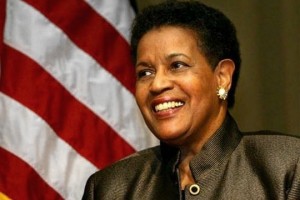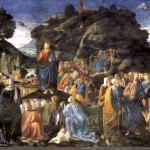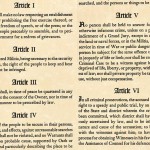
In a recent piece published in the Washington Post‘s On Faith section, A. James Rudin of Religion News Service talks about MSNBC commentator Lawrence O’Donnell’s insistence that the Bible has no place in a ceremony like the inaugural in a secular state. I simply don’t get this issue. Presidents aren’t swearing on the book to say they will govern by it; they are swearing on the book that symbolizes their own belief system, whatever that is. There is no church and state issue here.
The article rightly points out that the issue has gotten heated and that it is now more problematic when a politician doesn’t use the trappings of religion. Just as every presidential candidate must now end every speech by saying some variation of “God bless the United States of America” — which to the best of my knowledge only started as recently as Reagan. I agree that this trend should be checked, but not by ceding ground to anti-religious sentiments.
I don’t know Lawrence O’Donnell’s personal relationship with the anti-religion cause, but this fake issue is part of a concerted effort to deny the role of faith in people’s lives, and especially the role of faith in progress towards greater human freedom and dignity. I don’t need to make the point that faith was the driving force behind the anti-slavery and civil rights movements. It’s thus particularly symbolic that this first black president of the United States will be sworn in on bibles once owned by Martin Luther King Jr. and Abraham Lincoln.
Another recent piece, by Rachel Gordan in Religion & Politics, complained that the faith leaders on the podium and giving the prayers are almost always Protestant Christians, noting that there was a run of rabbis in the post-Word War II era starting with Truman, reaching its pinnacle when a rabbi at Kennedy’s inauguration actually prayed in Hebrew, but none since Reagan. The gist of the piece was that this is inappropriate in this multicultural society. I think it’s wrong to say there’s something inappropriate about a Protestant president asking Protestant clergy to give the prayers, but I have to agree it would be awesome to have something less traditional — less small-c conservative — in the mix. In Religion Dispatches, Mormon blogger Joanna Brooks offered a list of five non-Protestant women that would carry symbolic significance. (Hat tip to fellow Patheos blogger Caryn Riswold.) I have to say I was thrilled standing on the Mall four years ago to see and hear Rick Warren give the benediction. I know a lot of my progressive friends were annoyed, but I hoped it was a sign of healing for the political divide that is so entrenched in American religion too. Unfortunately, for the most part, that healing didn’t materialize.
It’s too much to ask of President Obama, with the history of Muslim birther nonsense, to follow Brooks’ picks of a Muslim or Sikh, and a Mormon would be an odd choice for him. But still, her suggestions, including Iraq veteran and Hindu Army chaplain Captain Pratima Dharm made me realize how great it would be if this moment was used to celebrate religious diversity — not to hide all symbols of religion as O’Donnell and the New Atheists urge, or to go with a safe middle-of-the-road Protestant choice, but instead to have a burst of something unexpected and fresh.
President Obama has taken a somewhat unexpectedly bold move in asking Myrlie Evers-Williams, the widow of slain civil rights leader Medgar Evers, to give the opening prayer — not the benediction, but the invocation, still an important symbol. She is also the first woman and the first lay person to give this prayer at an inaugural. But it’s not for him to give fuel to suspicions he’s not a “good Christian” by going further, and, anyway, it’s not in his nature. But maybe next time.












